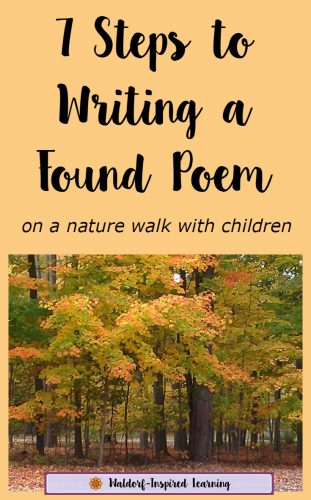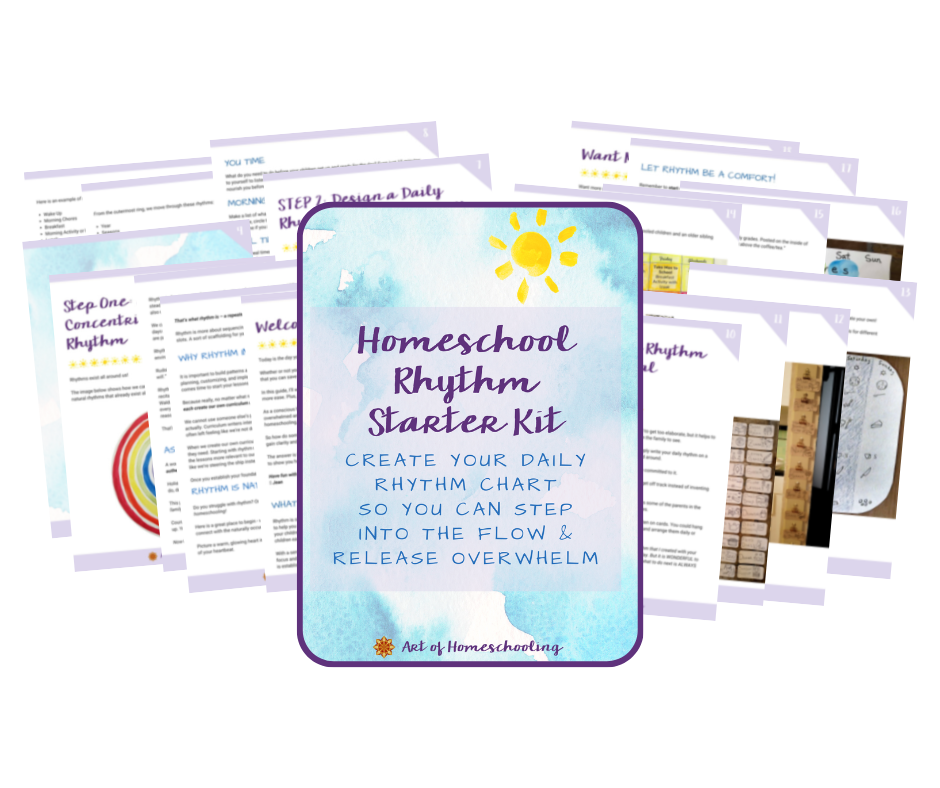Why do I love found poetry? Because the outcome is unknown. And isn’t that how everything is, really. We just deceive ourselves into thinking that if we control certain variables, we’ll achieve a certain outcome. Try this activity in your homeschooling: writing a found poem.
With found poetry, there’s no question that we have no idea how this is going to turn out!
A found poem is created by taking words from somewhere else and refashioning them. The words can come from existing texts -such as articles, speeches, letters, street signs, books – or your own recorded observations.These words are then ordered or re-ordered into a poem.
There are so many different ways to use this technique. For yourself or with your children. One of my favorites is to take a nature walk, record observations, and then create a collective poem.
 Steps to Writing a Found Poem
Steps to Writing a Found Poem
1. Gather your materials for a Nature Walk. Each person needs a sketch book and colored pencils. It’s fun for each to carry his or her own supplies along with a water bottle in a backpack.
2. Pick a nature trail to hike. Pack a lunch if you wish!
3. Once at the nature area, hike around for a bit and then find a “sit spot” – a place that looks inviting to sit for awhile. Like a bench, boardwalk, log, or even on the ground. Each person can choose his or her own spot.
4. Sit in silence for a bit, observing. Then sketch some images from your spot. After drawing, use the opposite page to write down observations: words or phrases describing what you see, hear, smell, feel.
5. Finish your hike and then once back at home, have everyone share their observations and pictures.
6. At this point, one person (Mom or Dad at first) can collect all of the words and make them into a poem. Or, the group can do this step together by putting the words and phrases on post-it notes or index cards so that they can be moved around.
7. And voila! A found poem. Don’t forget to give it a title.
If you want to extend this activity, it’s nice to return to the same nature spot each season to draw and write observations. Or even go back each month.
I’ve done this in groups of all sizes, from two to ten. And the results are always surprising!
Here are my favorite resources for Sharing Poetry with Children. And here is a previous post on how you can use Found Poetry for writing main lesson book summaries.
Found poetry is even great with teenagers. This fall, the homeschoolers in my high school composition and literature class are writing found poems about John Steinbeck’s Of Mice and Men. In small groups of two or three, each group is taking one of the six chapters and recording quotes from the book that describe the setting. They will then turn these lines into poems. We will end up with one poem for each chapter of the novel. I’ll let you know how they turn out.
For your listening pleasure, here is a found poem by Naomi Shihab Nye written from words she collected that were spoken by her toddler, One Boy Told Me.
And now, a found poem collected by seven children (ages 7-10) on a fall hike.
Woods in Fall
The ground is blanketed with leaves,
As we set out.
Leaves are fluttering down all around us,
Floating with the wind.
Gusty, a little chilly and cloudy,
More colors, more leaves than last time.
The rosy hue of crab-apples,
Among orange and yellow, golden and brown.
Leaves float downstream,
While others sink to the bottom like stones.
We find half-eaten acorns all over the ground;
And a squirrel exploring a log.
Looking up, we see a squirrel’s nest, a jumble of leaves
High up in the branches, falling apart now.
A rotting tree trunk, perhaps struck by lightning,
All full of bug holes and woodpecker holes.
Two squirrels play tag up a tree trunk,
While we sit and draw,
Where the platform is slippery from rain
And decomposing leaves.
With a gust of wind, sticks fall, stems fall and
Colorful leaves come raining down.
by the Children of Rainbow’s Edge
October 2010
Have you ever tried writing a found poem with your children?
If you want to start sharing poetry with your children, here are some favorite collections for you to check out.



I love this.
When we were in Wyoming, a woman on the retreat had everyone write one sentence about their experience. Then she collected them and WITHOUT changing a single word, fashioned them into a poem. I have no idea how this worked, but it was magic. Not to mention that there were about 40 people involved and she said it took her less that an hour. Oh my – just incredible.
I really, really believe we touch the divine when we work with words.
Love to you.
I hope you are feeling well.
S
It’s an amazing process really. I’ve had that same experience where the poem almost writes itself. Magic. Did you check out the link to the Naomi Shihab Nye poem? I think you’d really like it. And I agree, we touch the divine when we work with words. Love to you!